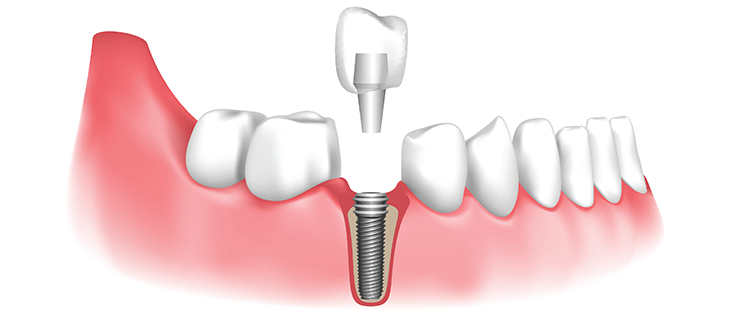


If you have one or more missing teeth and you are planning to get replacements, it may make sense to consider replacing them with other teeth, exposure to accidents that result in injuries to the jaw and teeth is one of the most common causes of broken and falling teeth along with decay or various oral diseases, This is why dental implants represent for these people where the new teeth fuse in the jaw bones or under the gums and work quite similarly to real teeth, so there are more reasonable solutions than traditional dentures, bridges or crowns.
Dental implants are metal pillars or implants that are surgically placed and implanted into the jaw bones below the gums and, once in place, allow your dentist to fit replacement teeth on them.
These dental implants are metal fittings that are surgically attached to the jawbone below the gum, and artificial teeth can be attached to them. In fact, these metal implants become attached to your bones through osseointegration (where the bone fuses with metal) and this process provides stable support for the teeth so that you can rely on them successfully while eating or talking.
Because the implants fuse with the jawbone, they provide firm support for the artificial teeth so that dentures and bridges on implants won't slip or move around in your mouth, a particularly important benefit when performing the essential tasks of natural teeth. They also help to feel and look more natural than traditional bridges or dentures.
For some people, regular bridges and dentures are not comfortable or even possible to install, due to stains, advanced dental spaces, uneven teeth, and gum disease. In addition, regular bridges must be attached to the teeth on both sides of the space left by the missing tooth, so they have a choice Dental implants have many advantages of implants, as there is no need to prepare the adjacent teeth or file them to hold the new replacement teeth in place.
You must have healthy gums and sufficient bone to support implants to receive implants successfully. You must also commit to maintaining the health of these structures, so careful oral hygiene and regular dental visits are essential to the long-term success of dental implants.
Implants are usually more expensive than other methods of tooth replacement, and most insurance companies usually cover less than 10 percent of the fee.
There are two main types of dental implants recommended by the European and American dental academies, which are endothelial and intramural implants. The most appropriate implant for you depends on the size, shape and health of your jaw bones. Your dentist will consult with you to reach the optimal choice for your health condition.
- Endothelial implants: They are surgically implanted directly into the jaw bones. Once the surrounding gum tissue has healed, a second surgery is required to attach the abutment to the original implant, and finally the artificial teeth are attached individually to each tooth individually, or grouped on a bridge or denture.
- Subperiosteal implants: consist of a metal frame that is attached to the jawbone beneath the gum tissue. When the gums have successfully healed, the structure becomes fixed to the jawbone. These implants, which are glued to the frame, protrude through the gum as with endothelial implants. Installing false teeth on the legs.
As always, practice good dental hygiene and make sure you follow the post-operative instructions given to you by your dentist, they may recommend that you only eat soft foods for a short period, and if you are a smoker they may urge you to quit as it may have adverse effects on the implant After your gums have healed, your dentist will remove the sutures and will be able to check for any infection if it occurs.
Be sure to ask any questions that arise so that you can make an informed decision with your dentist to determine the optimal technique and most appropriate implants for your dental implants and successfully achieve your goal.